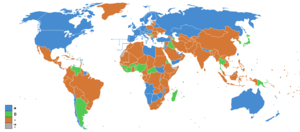Bullying aggressors typically exploit the weaknesses or defects of their victims. A stammer, squint, poor physical performance or disability may become a reason for scorn. Physical bullies will also torment people excel at school or work and so do better than them.
What effects may bullying have upon the victims?
Physical harm, pain and suffering top the list of the effects of bullying. However, emotional distress is equally disturbing. The greatest danger lies in the fact that the effects of bullying may last for a lifetime. The stresses and fears that bullying leads to can turn the victim’s life into a nightmare for many years. Some victims may lose their sense of self-confidence and self-esteem. Others may fall into depression. In extreme cases, bullying may provoke suicides. The victim’s performance at school may also be hampered by bullying through inability to concentrate in class or even intentional absenteeism.
How should we respond to bullying?
Many cases of bullying go unnoticed, unreported or simply ignored. Embarrassment and humiliation effected by bullying may be so profound that children are often afraid to report victimisation.
Bullying is not the problem of a single victim but of the whole environment where it occurs. Be it school or workplace, there is a need to implement a policy of combating bullies and bullying. Recognising the problem is the first step, then raising the victims’ self-esteem and increasing the awareness of how serious the situation is among all the people concerned. The universal truth should be voiced that everyone has the right to a safe environment and a responsibility to prevent bullying.
Cyber Bullying
Cyber bullying is defined as threats or other offensive behavior sent online to a victim or sent or posted online about the victim for others to see.
- It can take the form of a message on email or IM or a social networking site from someone who is threatening to hurt you or beat you up.
- It might be rumors posted on your profile or spread online for others to see.
- It might be the deletion of you on a friend’s “buddy list” to make you feel left out.
- It could be a profile made by someone pretending to be you.
- Or, someone hacking into your profile and writing comments pretending they’re from you.
In general, cyber bullying is bullying or harassing that happens online. Much of it is similar to what teenagers experience offline in schools, homes, or the community, but has the additional aspect of the Internet.
Cyber bullying occurs in many different places online including instant messaging, social networking sites, email, and chat rooms. The most common place cyber bullying occurs is over instant messenger, but it also can occur via other new technologies such as text messaging and personal digital assistants (PDAs).
What to do?
Here is a list of things that can be done in order to stop being cyberbullied:
- Ignore the person. Sometimes the easiest thing to do is to ignore the person and go on about your business.
- Log-off if the harassment is bothering you.
- Block or delete the person. If it is happening on Instant Messaging or some other place online that requires a ‘buddy list’, you can block certain users based upon their username, or delete them if they are in your buddy list. You can also block emails that are being received from specific email addresses.
- Change your information. If someone has hacked into your profile, change your password. If someone repeatedly sends you messages (like, ‘add me to your buddy list’ over and over), consider changing your username or email address.
- If there is a profile that was created about you without you knowing, contact the company who runs the site to have the profile or language taken off.
- If you are upset about what is being said, talk to someone you trust. Don’t feel like you’re alone.
Talk to adults
Many times, teens are able to take care of the cyberbullying on their own. Sometimes, it gets out of hand though, and it’s helpful to talk to an adult about what is going on. If the victim feels scared or overwhelmed, maybe even trapped, it’s definitely time to talk to an adult.
If someone doesn’t feel comfortable speaking with a parent, he/she should seek out other adults or authorities like a teacher, coach, school counselor, a youth group leader, or other adult family member such as an aunt or uncle.
Discussion proposals:
- How can victims of bullying and cyberbullying be helped?
- How can bullies be approached to make them stop harrassing other people?
- What is bullying in the army? What forms does it take?













